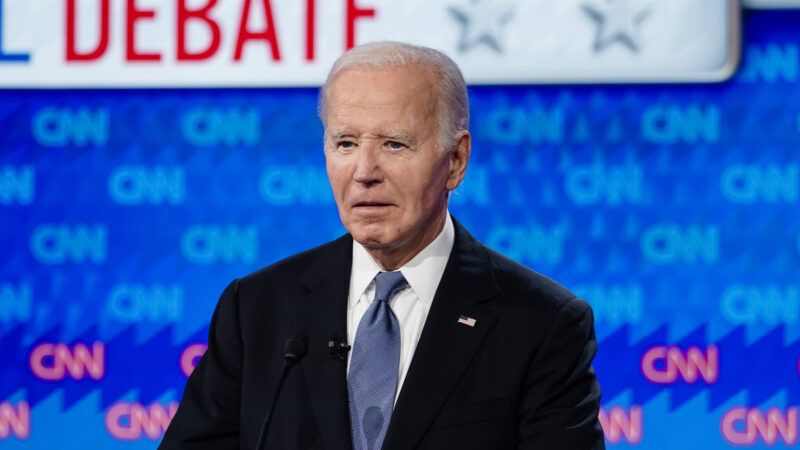At the Presidential Debate, Biden Says He 'Beat Medicare'
Biden's incoherence and Trump's comparatively cogent lies demonstrate just how poorly the two-party system serves supporters of small government.

At tonight's presidential debate, President Joe Biden made the shocking claim that under his administration, "We finally beat Medicare."
It's a remarkable statement from a Democratic president. One would assume Biden would want to tout his preservation of entitlement programs—given that neither party (and particularly not the Democratic party) wants to seriously tackle entitlement reform.
Instead, here is the president saying he finally "beat" the largest entitlement program of them all. Odd.
The best explanation for Biden's remarks is that it was a passing gaffe. In fact, later in the debate, he attacked former President Donald Trump for wanting to cut Medicare and Social Security.
That's not a particularly compelling explanation because that gaffe came at the tail end of a Biden answer that went from mildly cogent to utterly incoherent.
Said Biden, in response to Trump's own disingenuous defense of his record on debt and deficits (more on that later):
I should say in a ten-year period we'd be able to wipe out his debt. We'd be able to help make sure that all those things we need to do child care, elder care, making sure that we continue to strengthen our health care system, making sure that we're able to make every single solitary person eligible for what I've been able to do with the with the Covid, excuse me, with, um, dealing with everything we have to do with, uh, look, if…we finally beat Medicare.
Many of Biden's answers tonight were an incoherent jumble. The president repeatedly struggled with constructing germane responses, instead delivering halting, hard-to-follow answers that often bordered on incoherence.
Here was Biden responding to Trump's claims that the U.S. Supreme Court was right to overturn Roe v. Wade and return questions of abortion regulation to the states:
The idea that states are able to do this is a little like saying, we're going to turn civil rights back to the states. Let each state have a different rule. Look, there's so many young women who have been, including a young woman who just murdered and he went to the funeral. And the idea that she was murdered by a by by an immigrant coming in to. They talk about that. But here's the deal. There's a lot of young women being raped by their by their in-laws, by their by by their spouses, brothers and sisters, by just it's just ridiculous. And they can do nothing about it. And they try to arrest them when they cross state lines.
Um, what?
Once again, Biden starts with a relatively coherent take before trailing off to a weird, hard-to-follow point that has little to do with the immediate topic of discussion, or any topic of discussion a viewer of the debate would be able to discern.
Biden's transcribed answers, if anything, do him a favor. His demeanor and cadence revealed a man struggling with the basic demands of a 90-minute-ish televised debate.
In a debate, one garbled answer is forgivable. Maybe a few are. A garbled, borderline incoherent performance is bad. In fact, it's incredibly concerning, for at least two reasons.
The first is that Biden's performance makes clear that the president is not in fact hale and hearty as many of his partisans have claimed. If he can't bluff his way through a single CNN debate, he can't really be expected to handle the demands of one of the highest-stress jobs in the world.
Secondly, Biden's "low-energy" performance made it all the easier for a relatively more chipper, coherent Trump to get away with any number of lies, evasions, and bizarre claims of his own.
To circle back to his Medicare gaffe, Biden was following Trump's response to the debate moderators asking the 45th president to account for adding $8 trillion to the deficit during his single term in office, and particularly, how his tax cuts could be justified given all that red ink.
Trump defended his fiscal record by claiming his tax cuts were, on net, revenue-positive:
When we cut the taxes as an example, the corporate tax was cut down to 21 percent from 39 percent plus. Beyond that, we took in more revenue with much less tax, and companies were bringing back trillions of dollars back into our country. The country was going like never before, and we were ready to start paying down debt.
This isn't true.
The Committee for a Responsible Federal Budget has a handy explainer showing that excluding the fiscal impact of COVID-19 spending, billions in new spending and interest costs were added to the public fisc under Trump, while his tax cuts cost the country billions in forgone revenue.
There's a case to be made for tax cuts, even when they increase the federal deficit. Trump didn't make that case; instead, he pretended that there was, in fact, no trade-off between tax cuts and an increasing federal deficit.
Biden—himself neither a friend to tax cuts or fiscal responsibility—was totally unable to offer effective pushback on that point.
Libertarians, and friends of small government generally, have no champion among the two major party candidates. Given this sad reality, the best they can hope is for the candidates to at least check each other's most outrageous lies and evasions.
(Robert F. Kennedy Jr. did take part in a solo debate rebuttable moderated by occasional Reason contributor John Stossel.)
In other words, you would hope that the two-party system would at least contain some productive competition between the two parties realistically competing to control a bloated, out-of-control federal government.
What we saw tonight at CNN's debate confirms that the two-party system can't fulfill this task, even when the cameras are rolling.
Rent Free is a weekly newsletter from Christian Britschgi on urbanism and the fight for less regulation, more housing, more property rights, and more freedom in America's cities.


Show Comments (90)